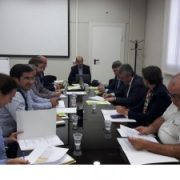Orellana values the importance of Big Data in the rationalization and sustainability of agricultural activity
The Director General of Rural Development and Forest Policy of the Ministry of Agriculture and Fisheries, Food and Environment, Esperanza Orellana has valued the importance of new information and communication technologies (Big Data) to contribute, through a more sustainable use of resources, to the rationalization of agricultural activity. Orellana, who made the remarks during the inaugural session of the conference held on March 29th by the Ministry to analyze current trends in the world of Big Data, said that policies to promote information and communication are crucial for agriculture.
For Esperanza Orellana, the application of Big Data in the agricultural sector has reduced the costs of information and exchange of products, transforming in turn the operation of companies and people
As she explained, farmers’ information needs will increase as they have to make increasingly complex decisions about how to use their land, what crops to produce and how, and in which markets they can buy inputs and sell their production. Addressing these challenges has highlighted the role of ICTs, which are making a significant contribution to the socio-economic growth and development of the agricultural sector.
During the conference, which took place at the National Center for Agricultural Training in San Fernando de Henares, Orellana highlighted the positive repercussions of these technologies, such as remote resources, which collect information on soil moisture , temperature, radiation, wind intensity or crop growth. Information that allows farmers to obtain better yields by optimizing crop management and reducing the use of such important inputs as fertilizers, pesticides, water and energy, which also contributes to the adaptation and mitigation of the effects of climate change in the agriculture.
Orellana: “Big Data has unprecedented possibilities to provide information for decision-making, and to bridge the digital divide between urban and rural society”
In this way, the Director-General has indicated, increasing data and quality information allows farmers to identify problems, plan and monitor management actions on their farms.
These multiple advantages, Orellana explained, have motivated the organization of a Conference on Big Data in Agriculture, which contemplates the applications of this technology to irrigation, control of harvests and collections and the world of wine, through the challenges and opportunities that offers the farmer the world of digitization.
Source: MAPAMA
















